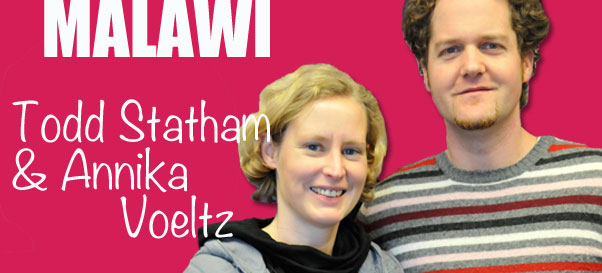 It might have been the Holy Family that I saw. Just after Christmas our family was driving through one of the many villages lining the highway. Through my driver’s side window these villages look all alike: thatched huts, a few stalls selling fresh vegetables and old chickens, a one-roomed store crammed with everything and nothing, kids kicking a homemade ball around a field of dust or mud (depending on the season). Nothing to make me take notice of anything in particular.
It might have been the Holy Family that I saw. Just after Christmas our family was driving through one of the many villages lining the highway. Through my driver’s side window these villages look all alike: thatched huts, a few stalls selling fresh vegetables and old chickens, a one-roomed store crammed with everything and nothing, kids kicking a homemade ball around a field of dust or mud (depending on the season). Nothing to make me take notice of anything in particular.
Then I thought saw Joseph, Mary, and the baby Jesus. The man was pedaling an old bicycle, wobbling up the shoulder of the road. His wife was sitting over the back fender, her arms wrapped tight around his waist. A baby was fast asleep on her back, swaddled in a colorful chitenge (a large piece of cloth). Now if it’s true—as Malawian friends tell me—that the bicycle is southern Africa’s real beast of burden, used for everything from hauling sugarcane to moving people, then it might have been the Holy Family that I saw. Maybe they were on their flight to Egypt? It could have been them. But truth is I was going too fast to get a second look. Our Landcruiser roared past them at 90 km an hour, our tailwind shuddering his bike and flapping her chitenge.


I’ve realized of late that I move too fast for this country. Malawi moves slow. As in 6 km an hour slow (i.e. average walking speed). The tourist brochures and guidebooks like to sell this speed as Malawi’s “relaxed” and “laidback” ethos. Let’s face it: it’s mostly just because people here are poor.
True, some folks own bikes and a very few have cars. But most walk. So Malawians move slow, especially when one leaves the urban areas for the countryside where the vast majority of people live. Here, a lot of folks still measure time by sun and seasons and not the hands of a clock. Here, the smell of woodsmoke from a hundred thousand fires wraps the hills and settles in the valleys. The Ghanaian theologian Mercy Amba Oduyoye observes: “One really ought to say that there is no life without smoke in Africa.” There’s nothing romantic about this image like it might be for Canada, where the scent of woodsmoke evokes summertime BBQs or crisp autumn evenings. Here, smoke smells like poverty: 85% of the population uses wood or charcoal for energy. Here, food cooks slow over the fire. And food only gets cooked after women have labored long, gathering sticks from the bush and hauling water from creeks or bore-holes in buckets balanced precariously on their heads.

Heavy rains have washed out the road leading to our house
Yes, the cities are sprawling from growth and more and more people have cellphones and bankcards, but Malawi remains largely rural, overwhelmingly poor, and very slow. Folks have to wait long to get what they need, whether its medicine at the hospital or fertilizer for their fields. And they have to walk long to get where they need to go. This country moves along at 6km an hour. But I hurtle through it at 90 km an hour. Of course I’m making attempts to get to know Malawi and its people, from studying Chichewa to reading books on traditional Malawian culture to asking lots of questions of Malawian colleagues and friends. But I still move too fast: a high-speed, high-tech, high-stress, errand ‘running’, hurry-up ‘Westerner’ in land of long walks and long waits. It leaves me wondering how much I’ll ever really know of this place.

Sometimes Malawi forces even us Canadians to slow down to walking speed! Annika and I just dug out the car after it got stuck in the thick mud left behind from the rains.
I’m coming to realize of late that my upbringing in the so-called ‘West’ may have left me too fast for God. Because God, like Malawi, moves slow. This is a frustrating fact of the Bible. It seems that God takes his time to do anything important. He could have made the world in seven seconds; instead, he took seven whole days. He made Abraham and Sarah wait decades on his promise of a child. He let his people suffer as slaves in Egypt for many years before he brought them to the promised land. And before they got there, God moved the people of Israel through the desert at 6 km an hour for forty years. He leaves the Psalmist languishing so long that the poor man cries out: “How long, O Lord, how long?” We “hurry-up” Canadians typically skip over the tedious opening chapter of a gospel like Matthew which chronicles generation after generation after generation after generation after generation living and dying before Jesus Christ finally arrives. God has a plan of salvation–it plays out in slow motion though, and despite Christ’s assurance that “behold, I am coming soon”, Christians are still waiting to see it finished! God moves slow. Sometimes even 6km an hour slow.
Can our supersonic, twittering, high-speed internet, fast food culture bear with a God of long walks and long waits? I was thinking about this when I serendipitously came across a book in the library of Zomba Theological College written by Kosuke Koyama, a Japanese missionary in rural Thailand. Like me, Koyama suffered major culture shock as a missionary. He had left his skyscrapered and Sony-ed homeland to work among Thai farmers in their rice-paddies and mango plantations. The culture shock left him pondering why it was that God, according to the Bible, typically moves as slow as the farmers’ plodding waterbuffaloes. He concluded that if God is love, as the Bible says, he is with people for the long haul. Koyama wrote: “The Word of God communicates the love of God. The love of God means God’s resolve to love men, though it may call for supreme sacrifice on his behalf and even when such sacrifice is implemented by ‘inconvenient’ and ‘inefficient’ processes. Since God is love, he always prepared to operate in history ‘inefficiently’. God’s love proves its genuineness by working its way through history without magic formula, easy quick fixes or technologically efficient ways” (Waterbuffalo Theology, p. 65).
It’s something to think about….if you have time.

The family at Christmas 2012: Mio, Todd, Aliko, Annika, Sophia


